- About us
- Support the Gallery
- Venue hire
- Publications
- Research library
- Organisation chart
- Employment
- Contact us
- Make a booking
- Onsite programs
- Online programs
- School visit information
- Learning resources
- Little Darlings
- Professional learning
Thomas Sutcliffe Mort (1816–1878) was one of nineteenth- century Sydney’s most prominent businessmen. Born in Lancashire and raised in Manchester, Mort emigrated to New South Wales in 1838, believing that the colony presented ‘a better opening for his industrious habits and his business abilities than there was in the land of his birth’. Within five years he had started his own business as an auctioneer of wool and other commodities – a profession for which his ‘suavity of demeanour, and imperturbable good temper, rendered him eminently fit’. By 1850, he was the premier auctioneer in Sydney and had interests in insurance, agriculture, railway and mining ventures, among others. But he is perhaps most remembered for other initiatives, such as the dairy farms he operated on the estate he acquired at Bodalla in 1860; and the dry dock he helped to establish at Balmain in 1855, which he progressed from shipbuilding to locomotive production and general engineering. He also funded experiments in freezing and refrigeration technology, forming the New South Wales Fresh Food and Ice Company in 1875. Mort donated some of his substantial wealth to community causes, contributing to the building of Sydney’s St Andrew’s Cathedral and the University’s St Paul’s College. Following his death in May 1878, the city marked its esteem for him with a statue in Macquarie Place and Balmain’s Mort Bay was named in his honour.
Theresa Shepheard Mort (née Laidley, 1820–1869) was eight years old when she came to Sydney, her father, James Laidley (1786–1835) having been appointed to the position of deputy commissary general. The eldest of eight children, she was educated at home and received art lessons from Conrad Martens and the ex-convict portraitist, Charles Rodius. Theresa was around twenty-one when she married Thomas Sutcliffe Mort, and twenty-three when her first child, James Laidley Mort, was born. Theresa had eight more children over the next seventeen years; seven of them survived to adulthood. She spent much of her married life at Greenoaks, the Darling Point home established by Mort in 1843. Theresa has been described as a devoted wife and mother and Thomas was devastated by her death from cancer at the age of forty-nine. Mort, however, later remarried, and was to have two more sons before he died.
Purchased 2001
A portrait of businessman Thomas Sutcliffe Mort and his wife Theresa, by an unknown artist, created in 1847. Daguerreotype photograph mounted in a copper coloured frame inside a protective case, measuring 8 cm in height and 7 cm wide.
This photograph has a mirror-like finish, the image is a range of grey shades. At certain angles the image disappears turning into a solid silver background. On moving, the image reveals itself again. Theresa is seated on the left, with Thomas on the right, against a blank wall with a square wooden table placed between them. An upturned top hat and a book are positioned on the table.
Theresa has a severe middle part in her hair. Coiled ringlets frame her face and brush against her shoulders. She has an oval-shaped face with a serious expression, with lowered eyebrows over almond-shaped eyes, a broad nose and full closed lips. Her left arm leans upon the table, fingers curled over to rest against her chin. She wears a lace-collared, long velvet cloak over a full-length long-sleeved dress, with a silk-like sheen, which ends in a deep ruffle. A straw bonnet decorated with velvet bands and a bow lies on her lap.
Thomas has luscious thick wavy hair, swept over in a right-side part and curling around his ears. He also has a serious expression, deep set and heavy-lidded eyes set over a large straight nose and unsmiling lips. His right forearm rests on the book placed on the table, fingers hanging off the edge, with a ring on his little finger. His left arm rests against his thigh. He wears a high-collared shirt with necktie. A dark double-breasted jacket is buttoned closed, ending mid-thigh. Light trousers cover his legs. His right leg is bent at the knee with his left stretching out in a more relaxed pose.
There are some marks on the surface of the photograph particularly on the bottom edge, slightly distorting the image.
Audio description written and voiced by Alana Sivell, 2021



On one level The Companion talks about the most famous and frontline Australians, but on another it tells us about ourselves.
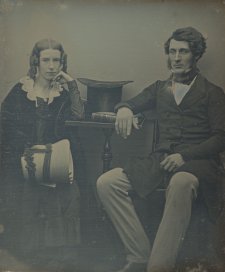
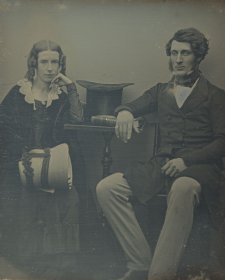
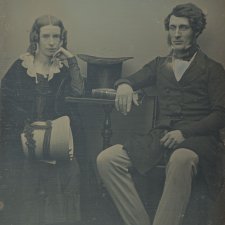
At just 7.8 x 6.2 cm, the daguerreotype of Thomas Sutcliffe Mort and his wife Theresa is one of the smallest works in the collection of the National Portrait Gallery.
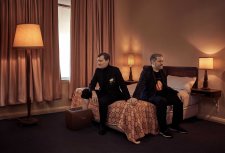
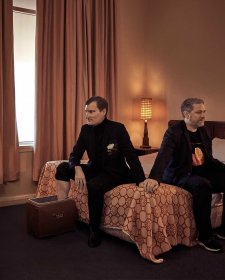
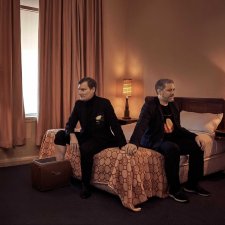
from Saturday 5 July
On show in Gallery 3, One-on-one showcases portraits of pairs from the collection from the 1800s to today.